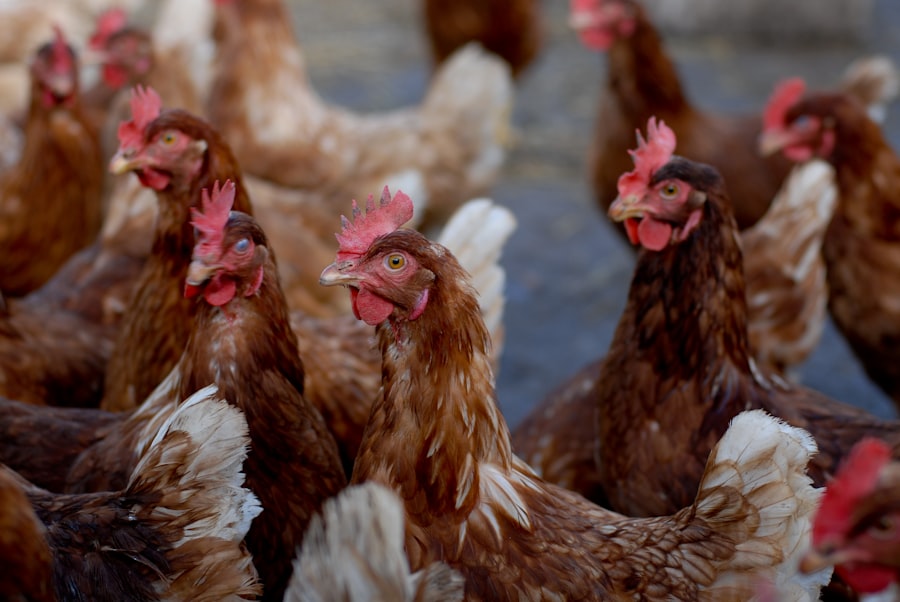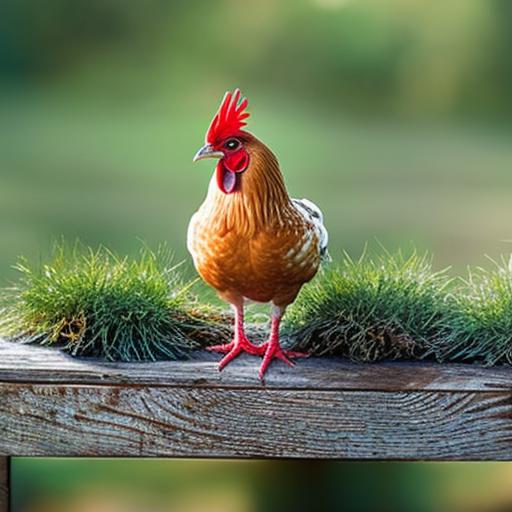Keeping chickens for egg production is a fun and rewarding hobby that can provide you with fresh and delicious eggs every day. Not only are homegrown eggs tastier than store-bought ones, but they are also healthier and more nutritious. However, it’s important to understand the basics of chicken care to ensure that your flock stays healthy and productive.
Chickens are social animals that thrive in a flock environment. They are also relatively easy to care for and require minimal maintenance. However, keeping chickens for egg production requires a bit more attention to detail than simply keeping them as pets. In order to keep your chickens laying, you need to provide them with a comfortable and safe living environment, proper nutrition, and regular care.
Key Takeaways
- Keeping chickens laying requires proper breed selection, comfortable housing, good nutrition, hygiene, and health management.
- Choose breeds that are known for their egg-laying abilities, such as Leghorns, Rhode Island Reds, and Sussex.
- Provide a coop that is spacious, well-ventilated, predator-proof, and equipped with nesting boxes and perches.
- Feed your chickens a balanced diet that includes protein, calcium, and other essential nutrients, and provide clean water at all times.
- Keep the coop clean and dry, and address any health issues or parasite infestations promptly to ensure a healthy and productive flock.
Choosing the Right Breeds of Chickens for Egg Production
Different breeds of chickens have different egg-laying capabilities, so it’s important to choose the right breed for your needs. Some popular breeds for egg production include Leghorns, Rhode Island Reds, and Plymouth Rocks. Leghorns are known for their high egg production rates, while Rhode Island Reds are known for their large brown eggs. Plymouth Rocks are a dual-purpose breed that is good for both meat and egg production.
When choosing a breed of chicken for egg production, consider factors such as egg size, color, and quantity. You should also consider the climate in your area and choose a breed that is well-suited to your local weather conditions.
Providing a Comfortable and Safe Chicken Coop
A comfortable and safe chicken coop is essential for keeping your chickens healthy and productive. Your coop should be large enough to accommodate your flock comfortably, with at least 2-3 square feet of space per chicken. It should also be well-ventilated to prevent the buildup of ammonia from chicken droppings.
Your coop should also be predator-proof to protect your chickens from predators such as raccoons, foxes, and coyotes. Make sure your coop has sturdy walls and a secure door that can be locked at night.
Ensuring Proper Nutrition for Your Chickens
Proper nutrition is key to keeping your chickens laying. Chickens require a balanced diet that includes plenty of protein and calcium to produce high-quality eggs. You can provide your chickens with commercial feed that is specifically formulated for egg-laying hens or you can supplement their diet with kitchen scraps and other treats.
In addition to feed, make sure your chickens have access to clean water at all times. Chickens require fresh water to stay hydrated and healthy.
Maintaining a Clean and Hygienic Environment in the Coop
A clean and hygienic environment is essential for keeping your chickens healthy and productive. Regularly clean your coop by removing old bedding and replacing it with fresh bedding. You should also clean out any droppings or debris from the coop on a regular basis.
In addition to cleaning the coop, make sure your outdoor run is also kept clean. Remove any debris or waste from the run on a regular basis to prevent the buildup of bacteria and parasites.
Regulating Lighting and Temperature in the Coop

Lighting and temperature can have a big impact on your chickens’ egg-laying capabilities. Chickens require at least 14 hours of daylight per day in order to lay eggs consistently. If you live in an area with short days during the winter months, you may need to provide supplemental lighting in order to keep your chickens laying.
Temperature is also important for egg production. Chickens prefer temperatures between 50-80 degrees Fahrenheit. If temperatures get too hot or too cold, it can affect their egg-laying capabilities.
Providing Adequate Space for Your Chickens
Chickens need plenty of space to move around and exercise. Make sure your coop and outdoor run provide enough space for your chickens to stretch their wings. Overcrowding can lead to stress, which can affect egg production.
In addition to providing enough space, make sure your chickens have access to perches or roosts where they can rest comfortably at night.
Regularly Collecting and Storing Eggs Properly
Regularly collecting and storing eggs properly is important for maintaining their freshness and quality. Collect eggs daily to prevent them from getting dirty or cracked. Store eggs in a cool, dry place such as a refrigerator or cool pantry.
It’s also important to handle eggs gently when collecting them in order to prevent cracking or damaging the shell.
Addressing Health Issues and Parasites in Your Flock
Keeping your chickens healthy is essential for keeping them laying. Watch for signs of illness or parasites such as lethargy, loss of appetite, or feather loss. If you notice any issues with your flock, address them promptly by consulting with a veterinarian or poultry expert.
You should also take steps to prevent parasites such as mites or lice by regularly cleaning the coop and providing dust baths for your chickens.
Enjoying Fresh and Abundant Eggs from Your Chickens.
With the right care and attention, keeping chickens for egg production can be a fun and rewarding hobby that provides you with fresh and delicious eggs every day. By choosing the right breeds of chickens, providing a comfortable living environment, ensuring proper nutrition, maintaining cleanliness, regulating lighting and temperature, providing adequate space, regularly collecting eggs properly, addressing health issues promptly, you can enjoy fresh eggs from your own backyard flock all year round!
FAQs
What is the best way to keep chickens laying?
The best way to keep chickens laying is to provide them with a clean and comfortable living environment, a balanced diet, and proper lighting.
How often should I clean the chicken coop?
The chicken coop should be cleaned at least once a week to prevent the buildup of bacteria and parasites that can harm the chickens and reduce egg production.
What should I feed my chickens to keep them laying?
Chickens need a balanced diet that includes protein, carbohydrates, vitamins, and minerals. A commercial layer feed or a homemade mix of grains, vegetables, and protein sources can provide the necessary nutrients.
How much light do chickens need to lay eggs?
Chickens need at least 14 hours of daylight to lay eggs consistently. If natural light is not enough, artificial lighting can be used to supplement the hours of daylight.
What are some common reasons for a decrease in egg production?
A decrease in egg production can be caused by stress, illness, age, lack of proper nutrition, inadequate lighting, or environmental factors such as extreme temperatures or predators.
Meet Walter, the feathered-friend fanatic of Florida! Nestled in the sunshine state, Walter struts through life with his feathered companions, clucking his way to happiness. With a coop that’s fancier than a five-star hotel, he’s the Don Juan of the chicken world. When he’s not teaching his hens to do the cha-cha, you’ll find him in a heated debate with his prized rooster, Sir Clucks-a-Lot. Walter’s poultry passion is no yolk; he’s the sunny-side-up guy you never knew you needed in your flock of friends!







